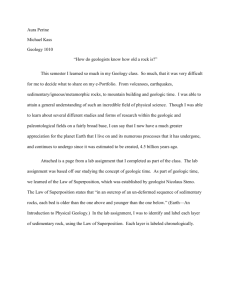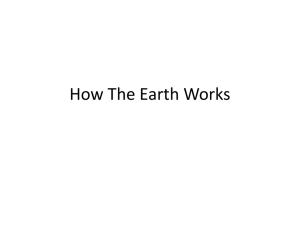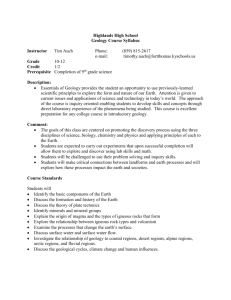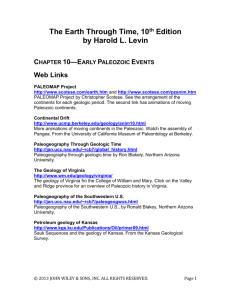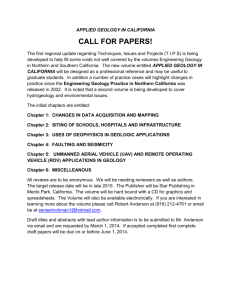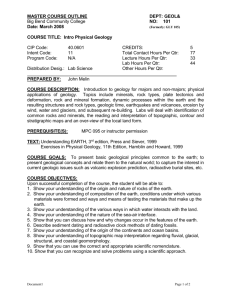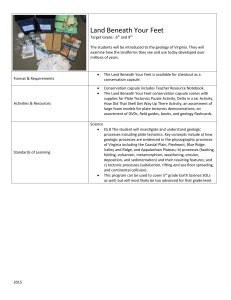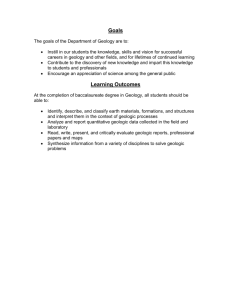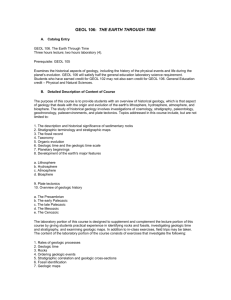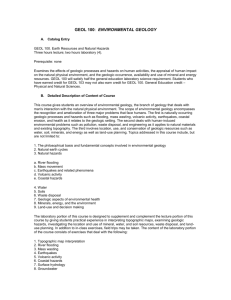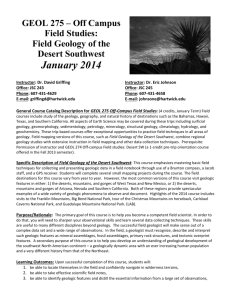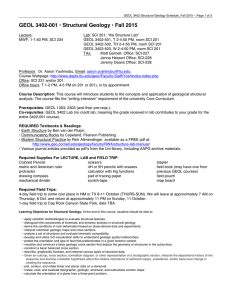Historical Geology Syllabus
advertisement
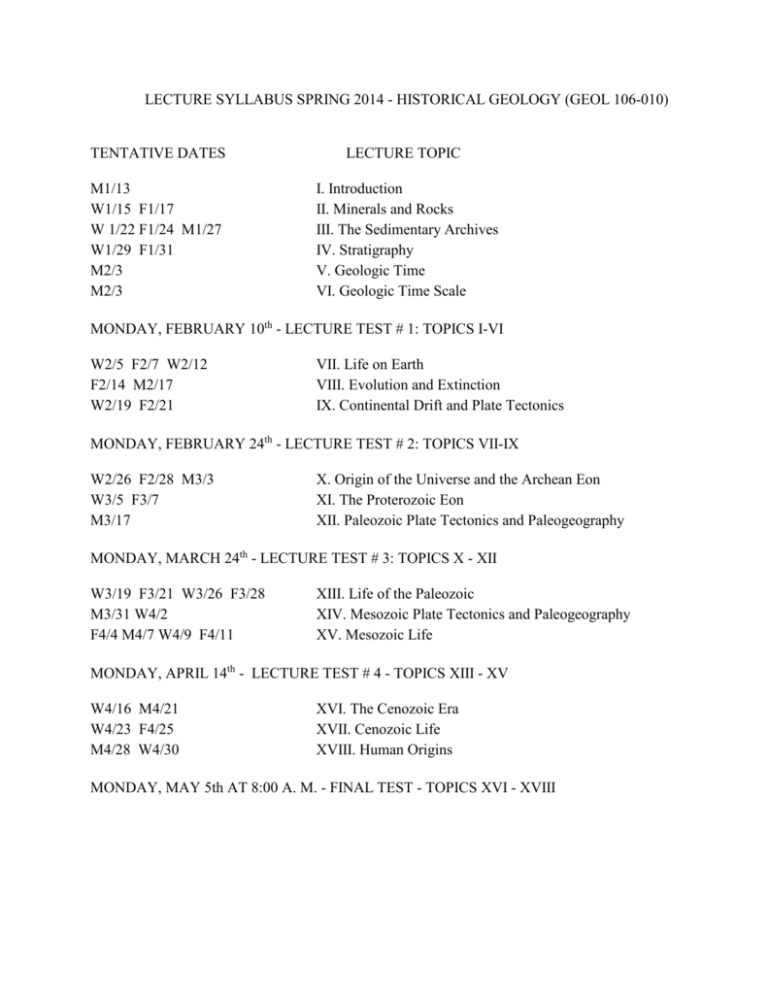
LECTURE SYLLABUS SPRING 2014 - HISTORICAL GEOLOGY (GEOL 106-010) TENTATIVE DATES LECTURE TOPIC M1/13 W1/15 F1/17 W 1/22 F1/24 M1/27 W1/29 F1/31 M2/3 M2/3 I. Introduction II. Minerals and Rocks III. The Sedimentary Archives IV. Stratigraphy V. Geologic Time VI. Geologic Time Scale MONDAY, FEBRUARY 10th - LECTURE TEST # 1: TOPICS I-VI W2/5 F2/7 W2/12 F2/14 M2/17 W2/19 F2/21 VII. Life on Earth VIII. Evolution and Extinction IX. Continental Drift and Plate Tectonics MONDAY, FEBRUARY 24th - LECTURE TEST # 2: TOPICS VII-IX W2/26 F2/28 M3/3 W3/5 F3/7 M3/17 X. Origin of the Universe and the Archean Eon XI. The Proterozoic Eon XII. Paleozoic Plate Tectonics and Paleogeography MONDAY, MARCH 24th - LECTURE TEST # 3: TOPICS X - XII W3/19 F3/21 W3/26 F3/28 M3/31 W4/2 F4/4 M4/7 W4/9 F4/11 XIII. Life of the Paleozoic XIV. Mesozoic Plate Tectonics and Paleogeography XV. Mesozoic Life MONDAY, APRIL 14th - LECTURE TEST # 4 - TOPICS XIII - XV W4/16 M4/21 W4/23 F4/25 M4/28 W4/30 XVI. The Cenozoic Era XVII. Cenozoic Life XVIII. Human Origins MONDAY, MAY 5th AT 8:00 A. M. - FINAL TEST - TOPICS XVI - XVIII HISTORICAL GEOLOGY LAB (GEOL 106-510 and 106-520) SYLLABUS: SPRING, 2014 DATE LAB W 1/22 I. Minerals and Sedimentary Rocks W 1/29 II. Stratigraphy W 2/5 III. Geologic Maps and Structures W 2/12 IV. Invertebrate Paleontology W 2/19 V. Pennsylvanian Field Trip W 3/5 MID-TERM TEST (LABS I-V) W 2/26 VI. Cretaceous Field Trip W 3/19 VII. Fossil Fish and Amphibians W 3/26 VIII. Fossil Protists and Plants W 4/2 IX. Reptiles, Early Synapsids and Birds W 4/9 X. Mammals W 4/23 FINAL TEST (LABS VI - X) GEOLOGY 106-010 HISTORICAL GEOLOGY – SPRING, 2014 INSTRUCTOR: Phillip Murry Office: Science 139F Phone: 254-968-9889 Email: murry@tarleton.edu Office Hours: 8:00 - 8:45 A.M. Monday, Wednesday and Friday TEXTBOOK (OPTIONAL): Harold Levin. The Earth Through Time. LAB MANUAL AND MAP (REQUIRED): Murry - Historical Geology Lab (this lab manual is available online) The American Association of Petroleum Geologists. Geological Highway Map of Texas. GRADES: Lecture Tests: 60% - consists of 4 tests Lab: 25% Final Test: 15% (NOT Comprehensive) Makeup Tests: All makeup tests consist of two-question essays given on Monday, April 28th at 5:00 p.m. in Science Building Room 112. If you are not satisfied with a lecture test grade, you may replace this grade with an essay test over the same material. If you decide to take the essay test, the essay test grade will be the grade I count. CELL PHONE AND COMPUTER USE: I do not allow cell phones (texting, etc.) or computer use in the classroom. STUDENT ACCOMMODATION: It is the policy of Tarleton State University to comply with the Americans with Disabilities Act and other applicable laws. If you are a student with a disability seeking accommodations for this course, please contact Trina Geye, Director of Student Disability Services, at 254.968.9400 or geye@tarleton.edu. Student Disability Services is located in Math 201. More information can be found at www.tarleton.edu/sds or in the University Catalog. ACADEMIC HONESTY: Tarleton State University expects its students to maintain high standards of personal and scholarly conduct. Students guilty of academic dishonesty are subject to disciplinary action. Academic dishonesty includes, but is not limited to, cheating on an examination or other academic work, plagiarism, collusion, and the abuse of resource materials. The faculty member is responsible for initiating action for each case of academic dishonesty that occurs in his/her class. Master Course Syllabus Department of Chemistry and Geosciences Historical Geology (GEOL 1064) Catalog Description: Historical Geology. (3-2) History of the earth from the formation of the solar system to the present. Topics include the earth's development, evolution of life on earth, changes to the earth's geography throughout its history, and the tools geologists use to investigate these topics. Lab fee $10. Prerequisites: Physical Geology (GEOL 1054) or approval of department head. Expanded Course Description: This is a second course in the geosciences, and is intended for freshmanlevel students from all disciplines who have successfully completed Physical Geology (GEOL 1054). Students may take this course to fulfill half of the university's “Lab Science” core requirement. The course provides a brief introduction to the creation of the universe and solar system, formation of the earth with its oceans and atmosphere, changes in climate and positions of continents, and the evolution of life. Specific topics include: the Big Bang and Solar Nebula Theories; composition and structure of the planets, earth and moon; principles of stratigraphy; relative and radiometric age dating; fossils and fossilization; the work of Charles Darwin and evolutionary concepts; the appearance of life on earth; changes to the earth's continents, oceans, and life over time; and what rocks and fossils can tell scientists about the past. Intended Knowledge, Skill, and Value Outcomes: Students who successfully complete this course will be able to: identify common rocks and determine the environments in which each major rock type is created; read geologic maps and interpret geologic information from the maps; recognize significant fossils; compute plate velocities from tectonic data; understand the geologic and biologic consequences of changes in the earth's global cycles; trace the positions of the continents through time; and trace the evolution of all modern phyla through time. At the conclusion of this course, students will appreciate: the process of discovery and scientific progress; the complexity of the earth's natural systems and of evolution; the impact of environmental changes on organisms; and human impact on geologic and ancient biologic systems. Course Requirements: The course grade is determined by a combination of the following elements, subject to the instructor's discretion: 3-4 non-comprehensive lecture exams, a comprehensive final exam, quizzes, field trips, and the laboratory grade (consisting of weekly laboratory exercises and/or quizzes, field trips, and laboratory exams).
